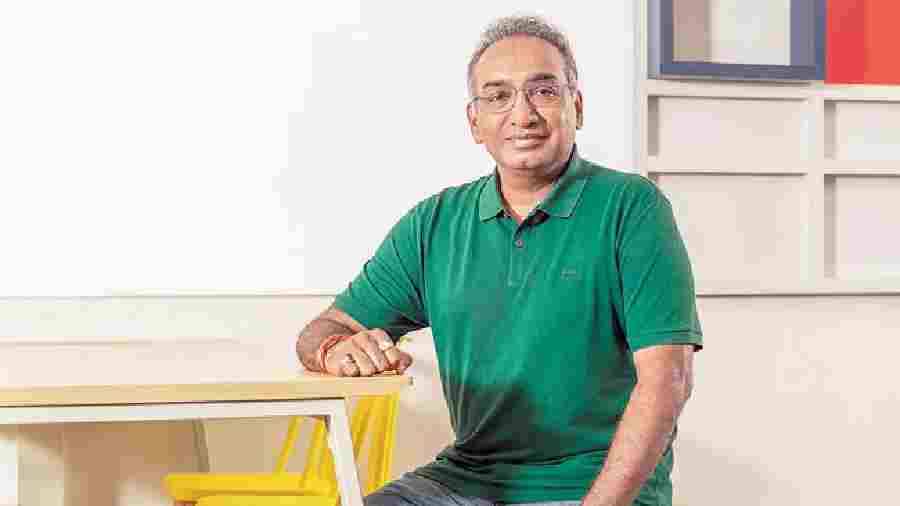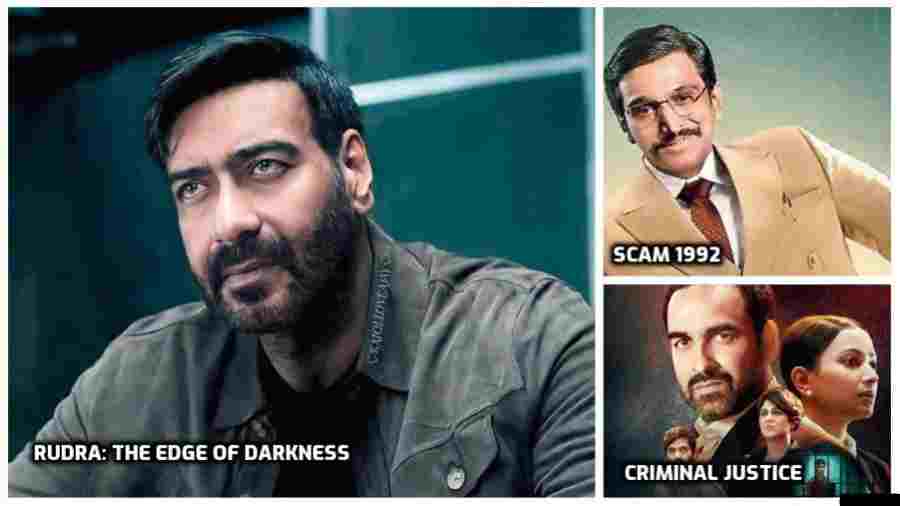They have some big-ticket, content-rich titles — Scam 1992 to Criminal Justice, Avrodh to Rudra — to their credit. Applause Entertainment turned five on August 16 and that was reason enough for The Telegraph to chat with CEO Sameer Nair on the remarkable journey so far, their foray into film production and the road ahead.

CEO Sameer Nair
Congratulations for five years of Applause Entertainment! You have done so much in such a short period of time... it’s quite unbelievable... what kind of sorcery is this?!
When I look at our list (of titles), I almost get tired! (Laughs) I don’t think there is any sorcery... we are just having a lot of fun doing this (smiles). I always say it’s not the story, it’s the storytelling. You come up with a good idea and by the time it reaches the screen, it’s a good 18 months. Writing, pre-production, production and the journey to a finished product involves a lot of teams... us, the production house, the actors and all of that... and because it’s such a long journey, it’s important to make it with people you like. You never know what the end destination is going to be because finally when the show releases, people will either like it or not... but you must at least have fun making it. We try and stay focused on it.
Whenever we embark on a project, we are very excited, childlike, we are like, ‘My God! This is going to be the greatest show ever!’ We have most often had fun with the process, and when we haven’t, we have told ourselves, ‘Yaar, yeh repeat nahi karna hain. Let’s not be unhappy again!’
We have, of course, built this model where we work with a variety of creative talents, which allows our content to have so much diversity. Other studios are mostly driven by a singular maverick creative thought. At Applause, we have built our model to have all kinds of conflicting creative visions. Most of the people we work with come with very unique creative processes and ideas of their own. And I am always curious, I am always like, ‘Okay, let’s make this your way and let’s see how it works out’.
So while we have broad frameworks within which we operate, there is also a lot of unique voices that come out. We started off with three people and today we are a team of 65.
Broadly, what have been the highlights of the last five years?
When we started, we knew that streaming platforms would grow and our business is going to grow. But there was no ready content, so we had to make it. We were hoping that once we approached the platforms with our content, they would like it and buy it. We set out to do it.
Our show Criminal Justice released in April 2019 and started off the Hotstar Originals property for the platform and that was our first validation. Then we started doing work across all the streaming platforms.
The next milestone came with SonyLIV when we did a deal with them for four shows because they were going to launch in July 2020. So we did Avrodh, Undekhi, Your Honor and Scam (1992) with them. Because of the pandemic, a lot of the big successes on SonyLIV happened remotely. We never had the Scam (success) party! (Smiles)
And then after the pandemic receded a little bit, we shot the next few shows. One is Tanaav, which is the adaptation of Fauda. We shot Rudra with Ajay Devgn.
We have ventured into film production with Aparna Sen’s The Rapist. It’s been feted at every possible (film) festival.
On the surface it looks like the scoreline of a tennis match. But the real game in the five years of Applause has been played game by game, point by point, break by break. The way we see this is not really the milestones... it’s all the days and nights and weeks.
What we try and work with is being ambitious, audacious and disruptive. We are looking to tell good stories, different kinds of stories across different types of genres, different scale.... We have done some Kannada and Tamil shows and we now want to scale that business up because the world has got to a point where stories from anywhere can be watched by anyone, anywhere. The endeavour is always to tell better and better stories.
Post-pandemic, in what way have viewing patterns changed and how is the content you are creating now reflecting that change?
Post-pandemic, people are really eager to get out again. That has reduced the amount of content consumption that happened during the lockdown. People have gone back to work, and even otherwise they want to get out for a meal, for a movie.... For all the streaming platforms, TV, movie theatres and social media, the same rules apply... which is share of time, share of attention, share of wallet. So we are now looking at consumers who have a lot of choice... spoilt for choice, if you will. They have become more discerning, they have become better connoisseurs of content. They have seen more, they are exposed to more and now they have lesser time and way more choices to consume. The onus is on us to tell stories that capture attention and then build through word of mouth. One also has to make content that can measure up to the standards of a global audience, be local enough and yet resonate among a wide spectrum of people.
What have been your biggest strengths?
The collaborative system of working that we have... the fact that we are able to work with a variety of production partners. Working on multiple projects at the same time is a real strength. We also bring in capital and greenlight projects and make them happen... so we are not waiting to get commissioned by anyone, we are going out there and making our content. And now we have a track record to back us up.
And your weaknesses?
It’s a weakness common for all. The creative business is a tough business and it requires patience, perseverance, discipline and constant creativity. It can be tiring. The best or worst part is that the moment a show releases, you reset the clock to the start point. You can’t bask in the glory of a successful show for more than a few days. Also, this process can make you make wrong choices and mistakes.
How is the film production space looking for you now?
We started out with series but the plan was always to make documentaries, animation, movies.... We started off with The Rapist and now we have about eight films that will be ready to release sooner rather than later. Now we are looking to make bigger, more mainstream movies, those that can probably open wider theatrically. But we love doing these content-rich, quirky movies. We have done a film with Saurabh Shukla which has Dimple Kapadia and Pankaj Kapur... it’s a teen romance between two 70-year-olds (smiles).
The strategy with our film production endeavour is that it adds to our slate. We are looking at the animation business. We will make Gandhi (that will bring together the Scam 1992 team of director Hansal Mehta and actor Pratik Gandhi), which will become a huge series for us.
So getting more ambitious and audacious...
I think we have always been so (laughs). When one talks of scale of ambition, it’s always from where one us and going up to the next level. It’s always in grades, it’s never a grandiose, ‘We will rule the world’ statement. Incremental improvement, incremental growth, incremental innovation is the way to go about things.











